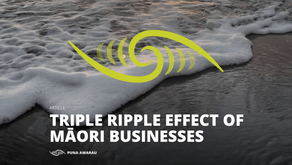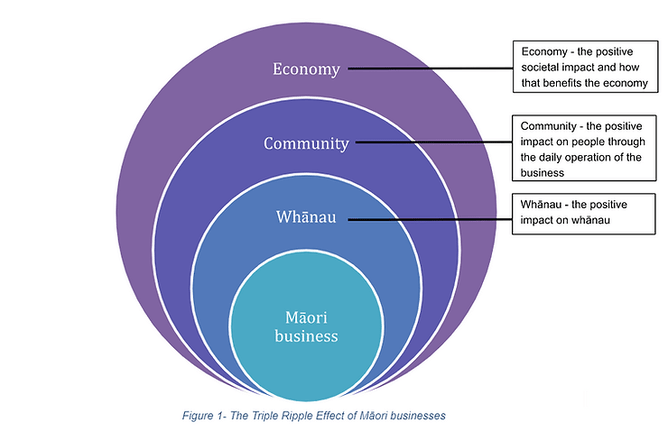The triple ripple effect of Māori businesses talks to the positive socio-economic impact Māori businesses create above and beyond delivering the goods, services and/or works they were established to provide.
These additional positive impacts are the ‘ripple effects’ and there are 3 broader areas Māori businesses consistently impact that contribute to a prosperous and inclusive Aotearoa.
Whānau - the positive impact on whānau
Community - the positive impact on people through the daily operation of the business e.g. employees
Economy - the positive societal impact and how that benefits the economy
Māori businesses can operate across any industry and will contribute positively to the economy through their triple ripple effect.
A fuller explanation of each of the ripple effects:
1. Whānau
Entrepreneurship is a key way individuals can build wealth for their whānau. Māori business owners on average have higher incomes than those in paid work. So, the financial impact of individuals who run successful businesses can build whānau wealth and create intergenerational wealth for their household and immediate whānau.
This creates increased financial freedom, allows whānau to build an asset base, purchase houses, plan for the future and all the good things that come with having pūtea to support whānau aspirations. Mana Motuhake (self-determination) and Tino Rangatiratanga (sovereignty) at an individual and immediate whānau level is what this ripple creates.
2. Community
Māori businesses create additional outcomes through the daily operations of their business. These outcomes benefit the wider community beyond simply their own whānau. For example, Māori businesses employ more Māori and hire those furthest away from the labour market such as rangatahi, people who have not been engaged in education or employment, and those with barriers to employment (e.g., no license, criminal conviction etc.).
This is often other whānau members from their hapu, Iwi or networks of friends. Māori businesses are more likely to give second and third chances to employees and support development of individuals through mentoring, referring to support systems, training and progressing them to higher roles. These are additional to simply hiring people for the purposes of growing the business. Māori businesses also create opportunities for other Māori businesses in their own supply chain (Buying from Māori businesses).
It's not unusual for Māori businesses to subcontract to other Māori businesses, mentor others and even refer work on to other Māori businesses that may be better suited. Additionally, Māori business owners are role models for rangatahi, whānau, employees and more. Inspiring, supporting and growing others around them is what this ripple is about.
3. Economy
The impacts of the first and second ripple directly influence the third ripple; the impacts on the economy. Creating whānau intergenerational wealth, quality employment outcomes, inspired and engaged rangatahi; these positive impacts are a direct result of Māori business success. The positive financial impacts of business for whānau have broader economic impacts as does having Māori employed in qualitty sustainable jobs.
This helps lift Māori prosperity and decrease unemployment statistics which has positive flow on effects within the economy (such as less welfare dependency, health issues, education attainment and so on). Additionally, Māori businesses have high rates of research, development and innovation. They hold most of the Māori asset base, and the profits of Māori businesses are more likely to linger and be spent in the local economy.
Successful Māori businesses help grow the Māori economy and therefore the Aotearoa economy.
Summary
Successful Māori businesses create a triple ripple effect. Their success positively impacts whānau, the wider community and the economy. By creating more successful Māori businesses and supporting the growth of Māori businesses we can create a triple ripple effect that has whānau benefits, wider community benefits and benefits to the economy.
DOWNLOAD ARTICLE HERE



